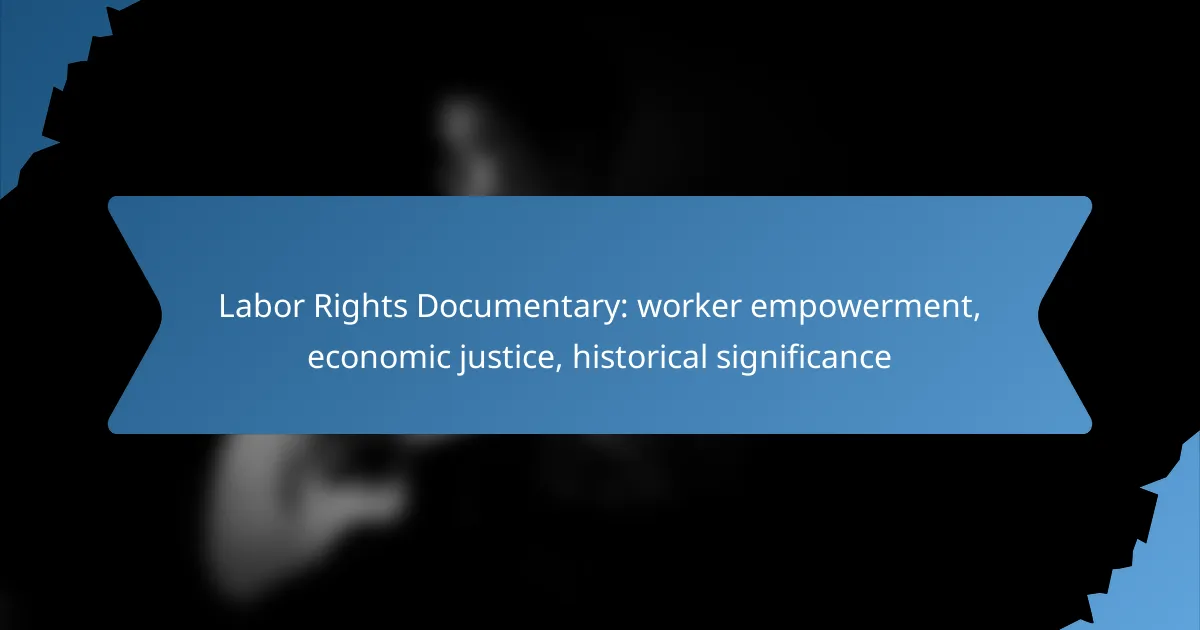Labor rights documentaries serve as vital educational tools that empower workers by shedding light on their rights and the historical struggles for economic justice. By showcasing the challenges and successes of past movements, these films inspire collective action and raise awareness about the ongoing fight for fair treatment and equitable pay in the workforce.
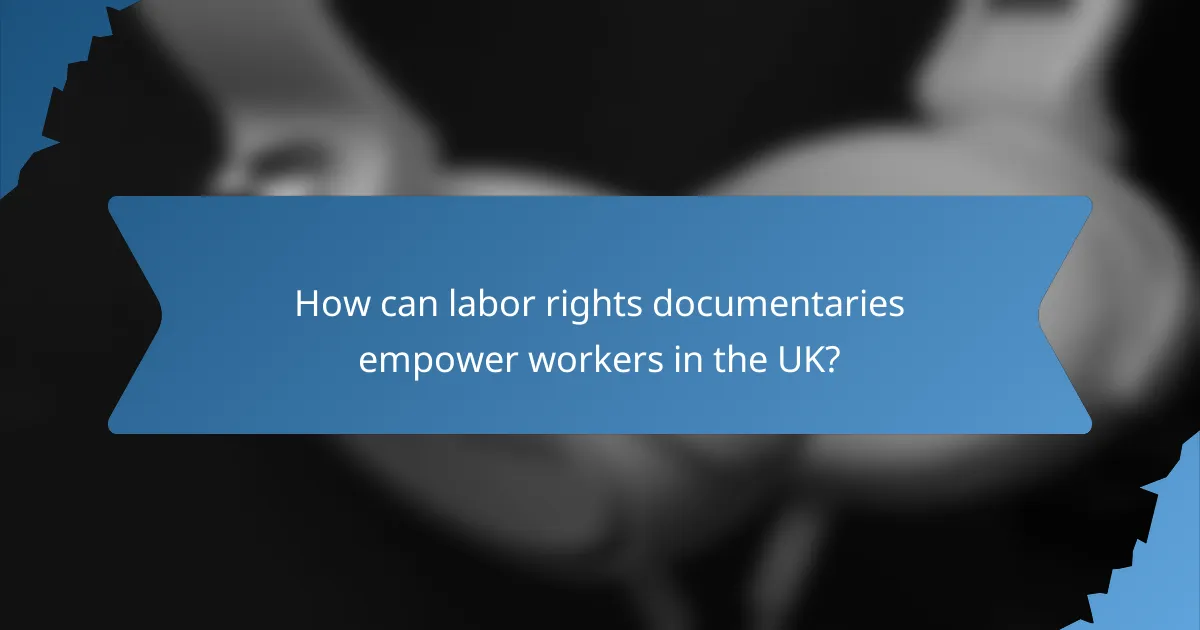
How can labor rights documentaries empower workers in the UK?
Labor rights documentaries can empower workers in the UK by educating them about their rights and inspiring them to take action for economic justice. These films often highlight historical struggles and successes, providing a framework for understanding current labor issues.
Increased awareness of labor rights
Documentaries serve as powerful tools for increasing awareness of labor rights among workers. By showcasing real-life stories and expert insights, they inform viewers about their entitlements under UK law, such as minimum wage, safe working conditions, and the right to unionize.
For instance, films that explore the implications of the Employment Rights Act can help workers recognize when their rights are being violated. This knowledge is crucial for fostering a more informed workforce that can advocate for itself.
Inspiring collective action
Labor rights documentaries can inspire collective action by illustrating the power of solidarity among workers. By sharing narratives of successful strikes or union formations, these films motivate individuals to join together for common causes, emphasizing that collective efforts can lead to significant change.
Examples like the 1984-1985 miners’ strike highlight how united action can challenge powerful entities. Documentaries that capture such moments encourage viewers to consider their own roles in advocating for labor rights.
Highlighting successful movements
Documentaries often highlight successful labor movements, providing blueprints for current and future activism. By showcasing victories, such as improved wages or better working conditions achieved through collective bargaining, these films instill hope and demonstrate that change is possible.
For example, films that document the rise of the UK’s trade union movement can serve as inspiration for workers facing similar challenges today. They illustrate the importance of persistence and strategic organization in achieving labor rights advancements.

What economic justice themes are explored in labor rights documentaries?
Labor rights documentaries often explore themes of economic justice by highlighting the struggles for fair treatment, equitable pay, and the fight against systemic inequalities in the workforce. These films serve as powerful narratives that illuminate the challenges faced by workers and the importance of collective action in achieving economic equity.
Income inequality
Income inequality is a prevalent theme in labor rights documentaries, showcasing the stark disparities between the highest and lowest earners within various industries. These films often illustrate how a small percentage of the population holds a significant portion of wealth, leaving many workers struggling to make ends meet.
Documentaries may present case studies of specific regions or sectors where income disparity is most pronounced, such as the gig economy or low-wage service jobs. By highlighting these inequalities, filmmakers aim to raise awareness and inspire action toward more equitable economic policies.
Worker exploitation
Worker exploitation is another critical theme, focusing on the unfair treatment of employees, including long hours, unsafe working conditions, and lack of job security. Documentaries often reveal how corporations prioritize profits over the well-being of their workers, leading to a cycle of abuse and neglect.
Through personal stories and investigative reporting, these films expose the realities of exploitation, prompting viewers to consider the ethical implications of their consumption choices. They may also highlight grassroots movements aimed at combating exploitation and advocating for workers’ rights.
Fair wages and benefits
Fair wages and benefits are central to discussions of economic justice in labor rights documentaries. These films often advocate for living wages, which allow workers to support themselves and their families without resorting to multiple jobs. They emphasize the importance of fair compensation and the role of unions in negotiating better pay and benefits.
Documentaries may provide examples of successful campaigns for wage increases or improved benefits, illustrating how collective bargaining can lead to significant changes in workers’ lives. Viewers are encouraged to reflect on the value of fair compensation and the impact it has on overall economic stability.
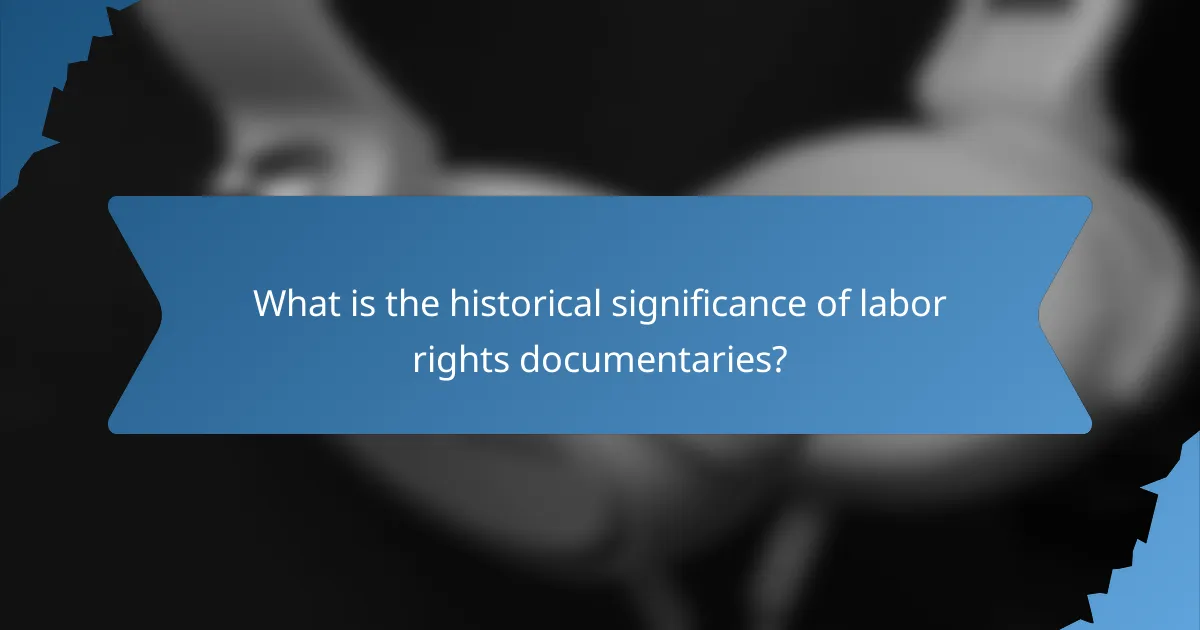
What is the historical significance of labor rights documentaries?
Labor rights documentaries play a crucial role in highlighting the struggles and achievements of workers throughout history. They serve as powerful tools for education and advocacy, raising awareness about economic justice and the importance of worker empowerment.
Documenting labor movements
Labor rights documentaries capture the essence of various labor movements, showcasing pivotal events and figures that shaped workers’ rights. By providing visual narratives, these films help audiences understand the historical context and the ongoing fight for fair labor practices.
For instance, documentaries about the United Farm Workers or the Fight for $15 illustrate the grassroots efforts that have led to significant changes in labor laws and conditions. These visual accounts can inspire new generations to engage in activism and support labor rights.
Preserving workers’ stories
Documentaries serve as a vital archive for preserving the personal stories of workers, giving voice to those often overlooked in mainstream narratives. By sharing individual experiences, these films humanize the struggles faced by workers and highlight the diversity within labor movements.
For example, interviews with factory workers or service industry employees can reveal the challenges they encounter, fostering empathy and understanding among viewers. This preservation of stories is essential for maintaining the historical significance of labor rights and ensuring that future generations learn from past struggles.
Influencing policy changes
Labor rights documentaries can significantly influence policy changes by raising public awareness and generating discussions around labor issues. When these films reach a wide audience, they can mobilize support for legislative reforms aimed at improving working conditions and economic justice.
Successful examples include documentaries that have led to increased advocacy for minimum wage increases or better safety regulations in various industries. By highlighting the real-life impacts of policy decisions, these films encourage viewers to advocate for change and hold policymakers accountable.
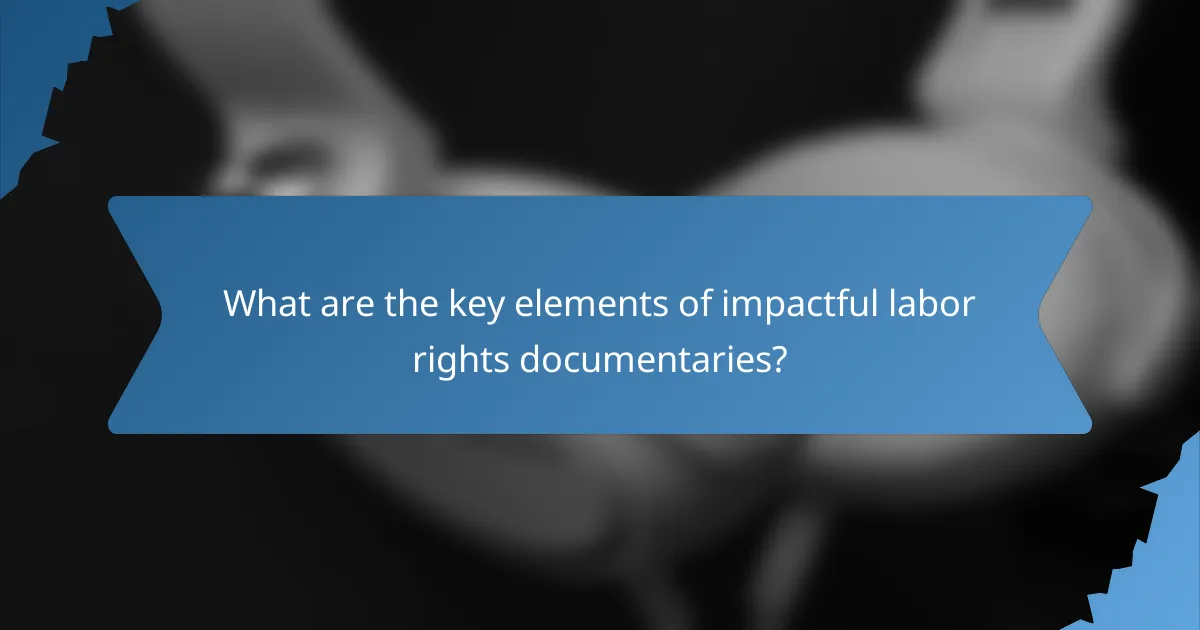
What are the key elements of impactful labor rights documentaries?
Impactful labor rights documentaries focus on authentic storytelling, expert interviews, and visual representation of struggles to effectively convey the importance of worker empowerment and economic justice. These elements help to engage viewers and foster a deeper understanding of historical significance in labor movements.
Authentic storytelling
Authentic storytelling is crucial in labor rights documentaries as it connects viewers emotionally to the experiences of workers. By sharing real-life narratives, filmmakers can highlight the challenges and triumphs faced by individuals in their fight for rights and justice.
Documentaries that feature personal accounts often resonate more with audiences, making the issues more relatable and urgent. This approach can include interviews with workers, their families, and community members, providing a multifaceted view of the labor struggle.
Expert interviews
Incorporating expert interviews adds credibility and depth to labor rights documentaries. Experts such as labor historians, economists, and activists can provide context and analysis that enriches the viewer’s understanding of the issues at hand.
These interviews can clarify complex topics like labor laws, economic impacts, and historical movements, making the content more informative. Filmmakers should aim to include a diverse range of perspectives to reflect the multifaceted nature of labor rights.
Visual representation of struggles
Visual representation is essential for illustrating the struggles faced by workers in labor rights documentaries. Powerful imagery, such as protests, working conditions, and community gatherings, can evoke strong emotional responses and highlight the urgency of the issues.
Using a mix of archival footage and contemporary visuals can create a compelling narrative that shows the evolution of labor rights over time. Filmmakers should strive to balance impactful visuals with informative content to ensure that the message is both engaging and educational.
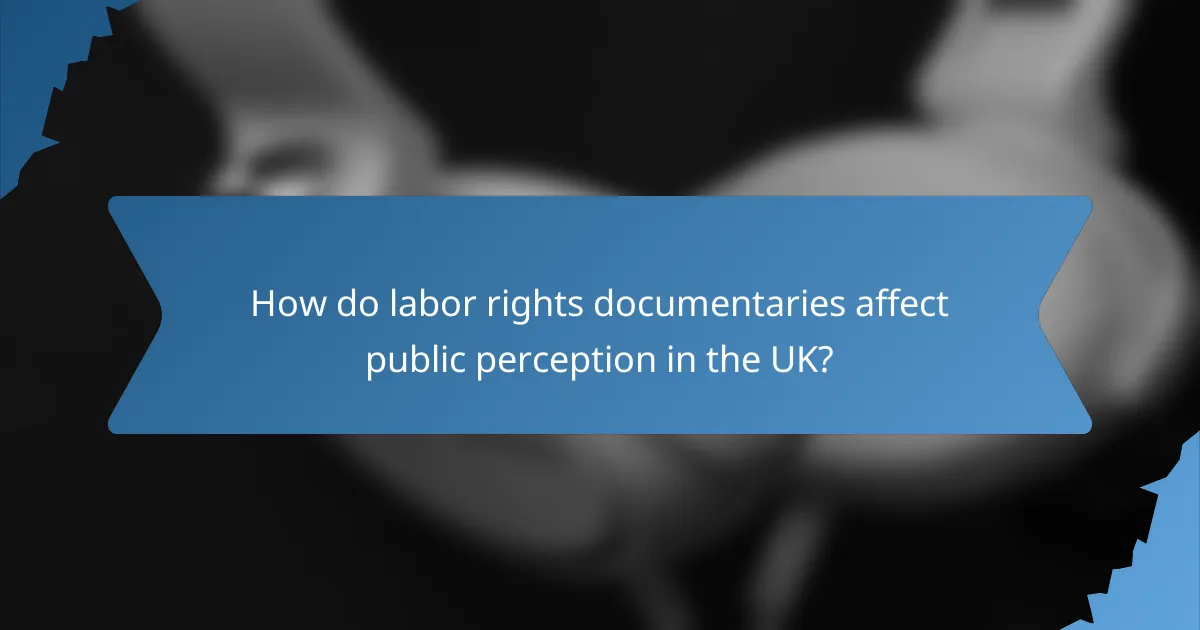
How do labor rights documentaries affect public perception in the UK?
Labor rights documentaries significantly shape public perception in the UK by highlighting the struggles and achievements of workers. These films serve as powerful tools for education and advocacy, influencing how audiences view labor issues and the importance of economic justice.
Shaping opinions on labor issues
Labor rights documentaries play a crucial role in shaping opinions on labor issues by presenting real-life stories that resonate with viewers. By showcasing the challenges faced by workers, these films can shift perceptions from abstract concepts to relatable human experiences.
For instance, documentaries that focus on specific industries, such as manufacturing or agriculture, can illustrate the impact of labor policies on workers’ lives. This personal connection often leads to a deeper understanding of the complexities surrounding labor rights.
Encouraging civic engagement
These documentaries encourage civic engagement by motivating viewers to take action on labor rights issues. They often include calls to action, urging audiences to support local unions, participate in campaigns, or advocate for policy changes.
Moreover, screenings and discussions around these films can foster community involvement, creating spaces for dialogue and collective action. Engaging with these narratives can empower individuals to become advocates for economic justice in their own communities.
Raising awareness of injustices
Labor rights documentaries raise awareness of injustices by exposing systemic issues that affect workers. They highlight problems such as exploitation, unsafe working conditions, and inadequate wages, prompting viewers to reflect on the broader implications of these injustices.
By bringing these issues to the forefront, documentaries can inspire public discourse and pressure policymakers to address labor rights more effectively. This heightened awareness can lead to increased support for reforms that promote fair treatment and economic equity for all workers.
